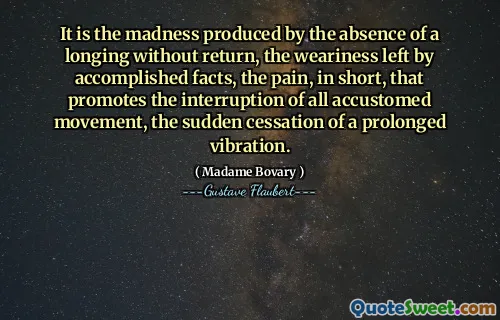
I wished to pour out all these thoughts to someone, but how to express that silence which is impossible to articulate, that which changes its images like clouds and rages within itself like the wind!
This quote poignantly captures the deep human struggle with expressing internal emotions and thoughts that are fluid and tumultuous in nature. It delves into the intimate experience of wanting to share one's innermost feelings but being hindered by the ineffable quality of those very emotions. The metaphor of thoughts changing like clouds suggests a certain ephemerality and constant transformation, emphasizing the difficulty in pinning down what one truly feels. Meanwhile, the comparison to wind raging within oneself conveys not only agitation but also the uncontrollable force of emotions that can overwhelm rational expression. In the context of Madame Bovary, a novel dedicated to exploring the dissatisfaction and inner conflicts of the titular character, this passage resonates deeply. Emma Bovary's yearning for an outlet and understanding is a recurring theme, as she grapples with an internal void and unrealized desires. Such reflections reveal a universal condition: the limitations of language to fully capture the complexity of human interiority. This evokes sympathy and insight into the human condition, reminding us of the solace in shared vulnerability and the perpetual quest for connection and understanding amid the volatility of our inner world.











